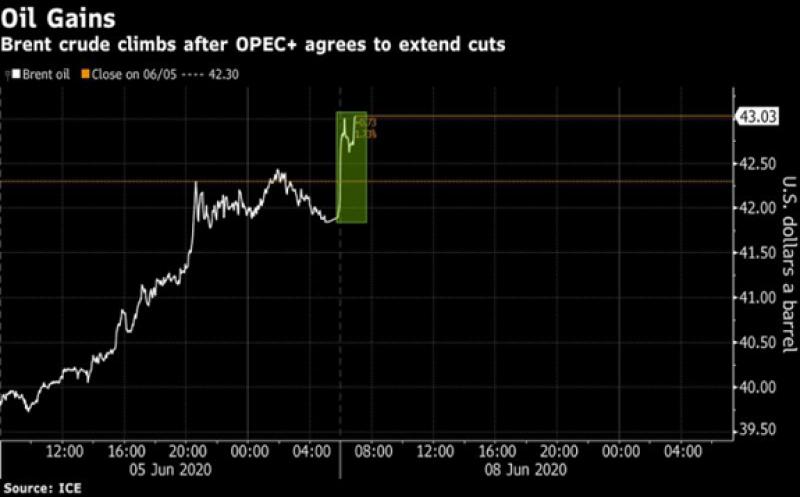Oil advanced above $43 a barrel in London after OPEC and its allies agreed to extend historic output curbs by an extra month, promising stricter compliance to ensure members don’t pump more than they pledged.

Brent futures added 2.4% after posting a sixth weekly increase on Friday, the longest run of gains since May 2018. The extension is a victory for Saudi Arabia and Russia, which were deadlocked in a brutal price war just two months ago. The de-facto leaders of OPEC+ showed their commitment to shore up oil markets globally over the weekend, and even cajoled Iraq, Nigeria and other laggards to fulfill their promises to reduce production.
Following the extension, Saudi Arabia made some of the biggest increases to the price of its crude in at least two decades. The steepest will hit July exports to Asia, while overall, the gains erased almost all of the discounts the kingdom made during its brief price war with Russia.
Oil has doubled since April as OPEC+ cuts trimmed a global glut and demand staged a rebound after the easing of restrictions in some countries, particularly China. Still, a sustained recovery may be hampered by deteriorating relations between Washington and Beijing, a second wave of infections, or returning U.S. shale supply following a gain in crude prices.
OPEC+ agreed to cut output by 9.6 million barrels a day in July, 100,000 barrels a day less than this month as Mexico will end its supply constraints. Any member that doesn’t implement 100% of its curbs in May and June will make extra reductions from July to September to compensate.
“The only potential Achilles heel, in what seemingly is an expected extension of current deep cuts through July, is the caveat of sub-compliant members requirement to compensate for lack of compliance,” Bjornar Tonhaugen, head of oil markets at Rystad Energy, said in a note. “Countries such as Iraq and Nigeria will struggle, we believe, to compensate fully, which puts increased pressure on the coherence of the alliance.”
The oil market “is still in a fragile state and needs support,” Russia’s Energy Minister Alexander Novak said in opening remarks at the virtual meeting on Saturday. The cartel will meet again in the second half of June for another review of the oil market.
Saudi Arabia’s decision to boost its official selling prices for July also comes as China’s demand is rising. The month-on-month increase for its flagship Arab Light crude to Asia, which accounts for more than half of Saudi oil sales, is the largest in at least 20 years.
Meanwhile, offshore drillers idled about a third of oil production in the U.S. Gulf of Mexico, amounting to about 636,000 barrels of daily output, due to Tropical Storm Cristobal, according to the Bureau of Safety and Environmental Enforcement.